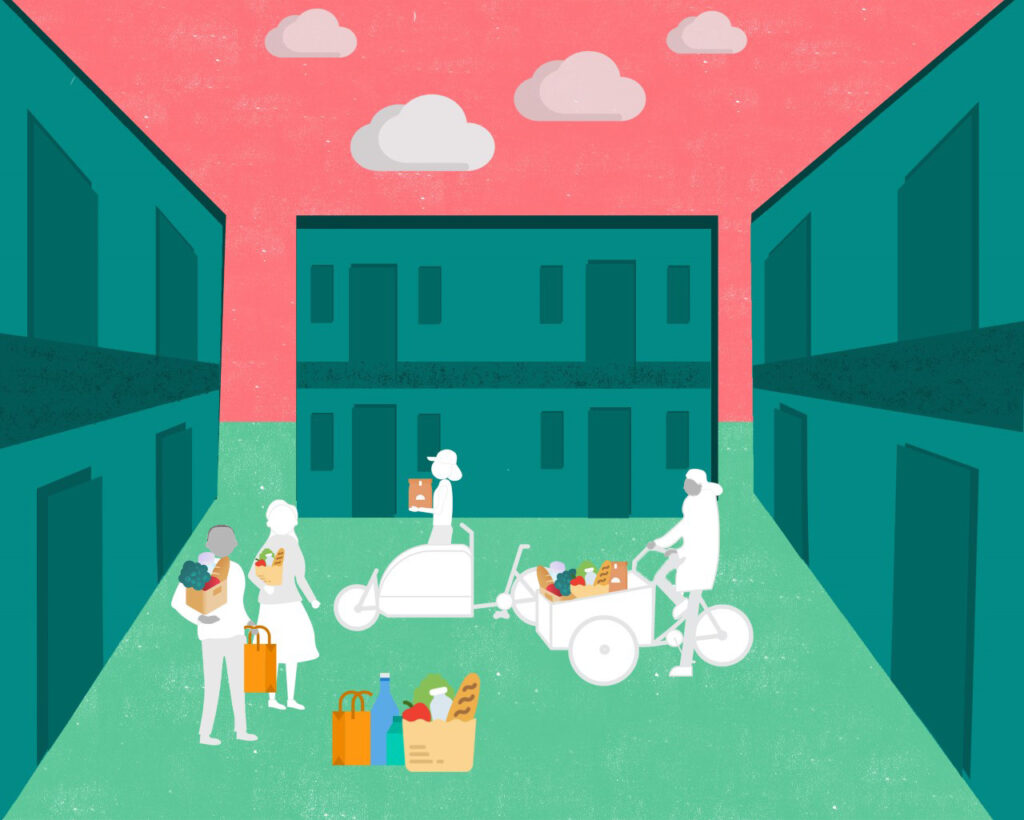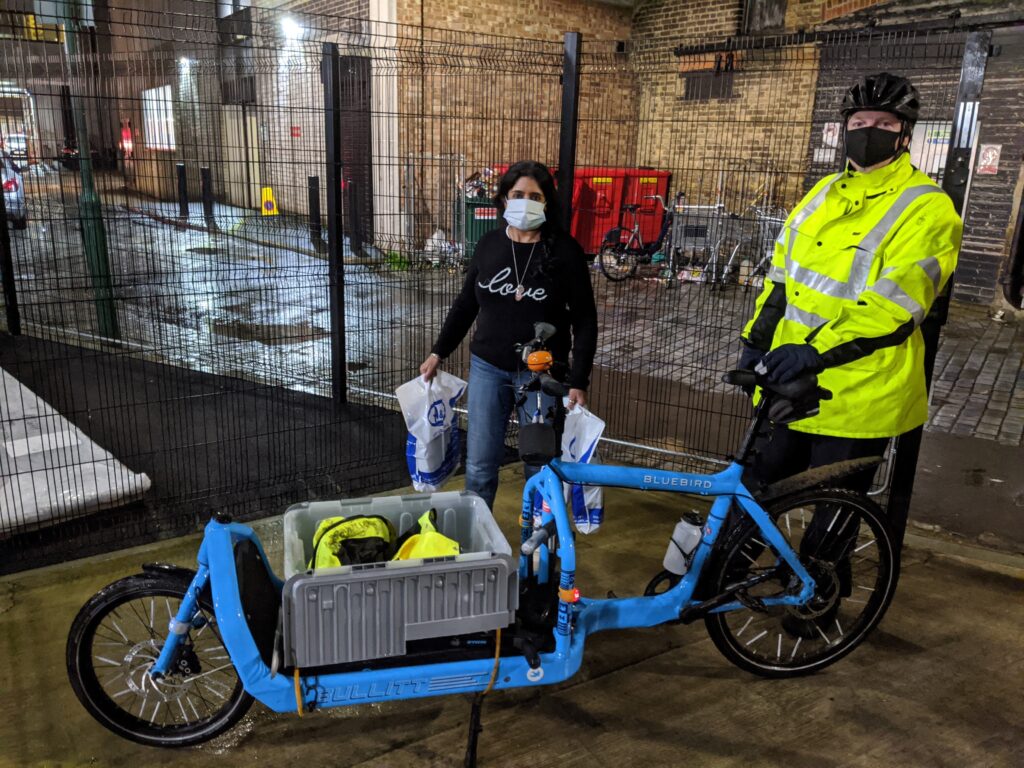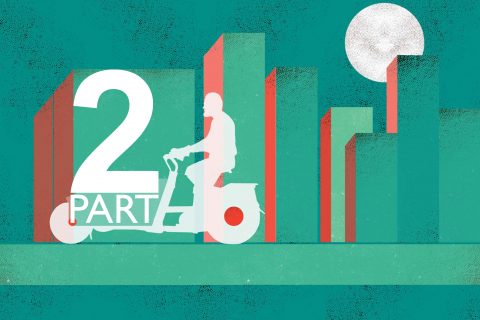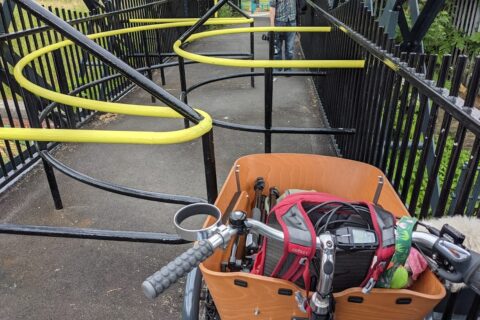What is the communal role of the cargo bike?

It is a wet January evening and I am cycling with Michael Barratt, a transport professional and community volunteer. This evening we are making our way from his home in Woodford to the Ilford-based Project Malachi Hostel, in the London borough of Redbridge. This ten-mile round trip is one Barratt has been making every Wednesday since June 2020. At approximately 5 pm he picks up fifteen hot meals from nearby Rotary Club members Peter and Esther, before threading his way across parks, along dual carriageways and through residential streets. The pace is steady, but efficient, and when we arrive a member of staff is on hand, ready to unload the meals off Barratt’s cargo bike.
Cargo bikes have been performing these types of food deliveries for decades, but perhaps only since the first UK lockdown has their communal value been fully understood. Across London – from Ilford to Lambeth and many places in between – cargo bikes have been at the centre of community efforts to deliver essentials to residents, the vulnerable, and those shielding from the dangers of the coronavirus. In fact, the last mile role which cargo bikes perform so successfully in the commercial sector is a perfect fit for the hyperlocal nature of deliveries for communal purposes.
Alix Stredwick is the founding director of CarryMe Bikes CIC, an East London-based social enterprise which provides cargo bikes and other types of cycles to the local community. She sometimes gives customers discounted rates, on the understanding that the cycles are being used to help facilitate a range of community projects. She relayed how during the spring 2020 lockdown she was inundated with customers wanting to hire cargo bikes to help their local communities. Examples include Hackney-based Round Chapel neighbourhood projects and the Tower Hamlets refugee service, both used cargo bikes to deliver food to vulnerable people.

In South London, the cargo bike logistics company, Pedal Me, partnered with Lambeth Council to deliver nearly 10,000 care packages to residents during the spring lockdown. As well as delivering packages, riders transported vulnerable patients for hospital visits. Trust in cargo bikes as a safe mode of transport is aided by their door-to-door nature, the limited number of surfaces, and their provision of outdoor seating. A month into the six-week operation, volunteers offered to help the Pedal Me team organise and optimise deliveries at a local recreation centre. Two further hubs were opened in the north and south of the borough, effectively recreating the type of infrastructure commonly used for commercial deliveries in large cities.
Following our delivery for the residents at the Malachi hostel in Ilford, Barratt and I spoke to Jason, one of the hostel’s community care workers. He explained that the Salvation Army-owned hostel serves as a steppingstone for a rolling complement of approximately thirty residents. The project is unique as it integrates a hostel with a social enterprise – a bicycle refurbishment workshop no less – designed to provide residents with an option to get back into the workforce. Jason believes that food deliveries via cargo bike fits the ethos behind Project Malachi perfectly and is an initiative which could be rolled out for similar projects.
Just before we leave, I ask Barratt whether making the deliveries via cargo bike has benefited him personally. He tells me that he once had to use a car because his cargo bike required maintenance. Though he admitted the journey itself was a few minutes quicker, he was unable to find a parking space close to the hostel, which caused both unnecessary stress and delay, in addition to the cost of parking. By contrast, on his cargo bike, Barratt can cycle door to door, while the use of segregated routes mitigates congestion and enables him to accurately schedule his arrival with hostel staff.

Though communal cargo bikes continue to demonstrate proof of concept on a micro-city level, is there the potential to deliver macro-city benefits which more closely mirror the role played by their commercial counterparts? Barratt believes so and is quick to point out that there are huge opportunities for the trialling, and scaling up, of communal cargo bike use for similar projects in cities across the UK. In a sector where communal agents must be frugal, the inherent economic advantages of cargo bikes over motorised modes, such as their lower running costs, complement their recognised environmental benefits and the feel-good factor associated with their use.
The pandemic has challenged communities in ways that have not been experienced in a generation, necessitating that they quickly find practical solutions to ensure the most vulnerable are provided for. In London, and other cities across the UK, cargo bikes have not only helped communities meet this need but have the potential to fulfil a more comprehensive role, drawing upon the equitable, economic, and environmental credentials which the mode possesses. Wider communal uptake could be achieved via sponsorship and similar commercial initiatives, though, ultimately, it is important that communities themselves continue to trial and demonstrate that the value of cargo bikes is there for the benefit of all.









This is also a nice community based project:
https://cargobikelife.wordpress.com/2016/03/31/the-good-bike-a-community-cargobike-in-somers-town/